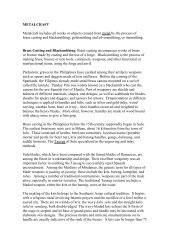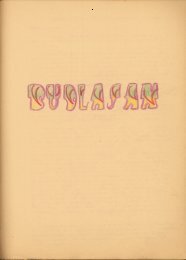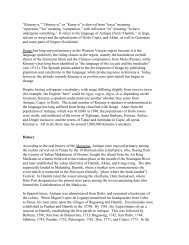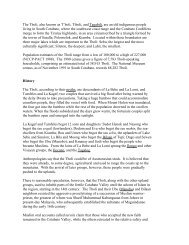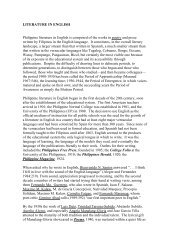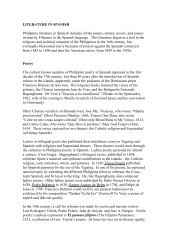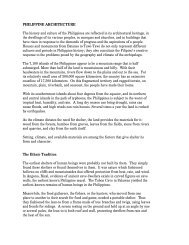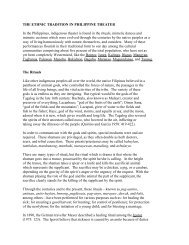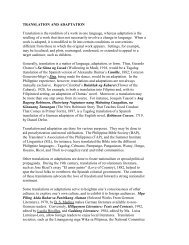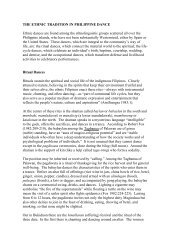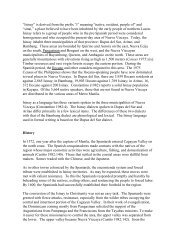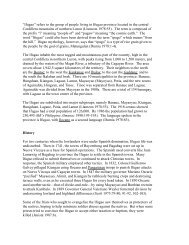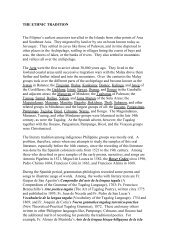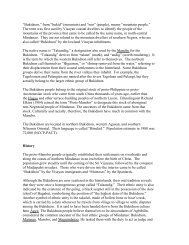The word “Ibanag” derives from the prefix “i” meaning ... - Buffalo
The word “Ibanag” derives from the prefix “i” meaning ... - Buffalo
The word “Ibanag” derives from the prefix “i” meaning ... - Buffalo
Create successful ePaper yourself
Turn your PDF publications into a flip-book with our unique Google optimized e-Paper software.
<strong>The</strong> Ibanag believe in spirits which inhabit <strong>the</strong> world. <strong>The</strong>re are unseen spirits <strong>the</strong>y call<br />
i ari nga masingan or “those who cannot be seen” (Llamzon 1978:43). To appease<br />
<strong>the</strong>se spirits and allay <strong>the</strong>ir own fears, <strong>the</strong>y make offerings. Sometimes, <strong>the</strong> minangilu<br />
or minannanad (or mangilu), folk medics who claim to have contact with <strong>the</strong> o<strong>the</strong>r<br />
world, are asked to be mediators and maintain harmony between <strong>the</strong> material and <strong>the</strong><br />
spiritual world.<br />
Sickness and diseases are believed to be caused by offended spirits, who have to be<br />
appeased. <strong>The</strong>re are two methods employed by <strong>the</strong> minangilu or minannanad to<br />
diagnose <strong>the</strong> infirm (Llamzon 1978:43). In <strong>the</strong> first method, <strong>the</strong> minannanad moistens<br />
<strong>the</strong> palm with coconut oil called denu and lemon juice. <strong>The</strong> minannanad <strong>the</strong>n massages<br />
<strong>the</strong> sick and declares that <strong>the</strong> tu naponna ira (dead relatives) need something and are<br />
asking for prayers. A makeshift altar is set up in <strong>the</strong> living room and a padasal is called.<br />
Relatives, neighbors, and friends are invited to offer prayers. Food, such as choice<br />
morsels, a tiny cup of sikulate (chocolate) and rice cakes, are likewise prepared and<br />
offered to <strong>the</strong> soul. This ritual is called mattunnak.<br />
<strong>The</strong> second method involves smoking or fumigation and is called assub. <strong>The</strong> minangilu<br />
uses charcoal, chicken fea<strong>the</strong>rs, coconut frond blessed by <strong>the</strong> priest on Palm Sunday,<br />
salt and a piece of alum or piedralumbre. Heated bunch charcoal is placed in a<br />
container, over which <strong>the</strong> patient stands. <strong>The</strong> minangilu prays and burns <strong>the</strong> materials<br />
one at a time, seeing to it that <strong>the</strong> fumes envelop <strong>the</strong> patient. <strong>The</strong> piedralumbre is<br />
extracted <strong>from</strong> <strong>the</strong> embers and allowed to melt, changing into shapes which may suggest<br />
<strong>the</strong> cause of <strong>the</strong> ailment.<br />
Animal sacrifice has figured prominently in many Ibanag rituals. An example is <strong>the</strong><br />
netabba (sacrificial pig) offered to a patron saint. <strong>The</strong> netabba may be offered during<br />
town fiestas or during <strong>the</strong> wake of a deceased member of a family. When offered during<br />
fiestas, <strong>the</strong> animal offering is accompanied by <strong>the</strong> sambali and <strong>the</strong> parosa— a song and<br />
dance dramatization of <strong>the</strong> life of Santo Domingo, <strong>the</strong> patron saint of Casibarag.<br />
<strong>The</strong>re are many o<strong>the</strong>r beliefs which have been classified as situational. <strong>The</strong> tabba<br />
(literally, “opposite”) refers to <strong>the</strong> rule in life by which one may find oneself in a<br />
situation which is <strong>the</strong> reverse of one’s present state. This belief has developed among<br />
<strong>the</strong> Ibanag a sense of temperance and prudence. <strong>The</strong> concept of tabba is not limited to<br />
human activities alone but also to <strong>the</strong> movements of nature. Thus, a bountiful harvest<br />
will have its tabba in <strong>the</strong> form of a drought or sickness and death of children.<br />
<strong>The</strong> concept of matulao sets in when an endeavor or enterprise suddenly fizzles out.<br />
<strong>The</strong> term is derived <strong>from</strong> <strong>the</strong> root <strong>word</strong> “tulao” which implies that <strong>the</strong> charm of success<br />
has been neutralized. This concept assumes a belief in objects of galing-galing or<br />
charms which give power to humans, such as ilug na lalung (egg of a rooster), batu ta<br />
unag na niog (stone inside a coconut), and inki na palutarag (forefinger of a first-born<br />
boy) stolen <strong>from</strong> <strong>the</strong> cemetery on a Holy Friday. <strong>The</strong>re are objects and activities,<br />
however, which can neutralize <strong>the</strong> power of <strong>the</strong>se charms. For example, salt placed<br />
beside a gambler dispels <strong>the</strong> luck provided by <strong>the</strong> charms of <strong>the</strong> gambler. Roasting of a



